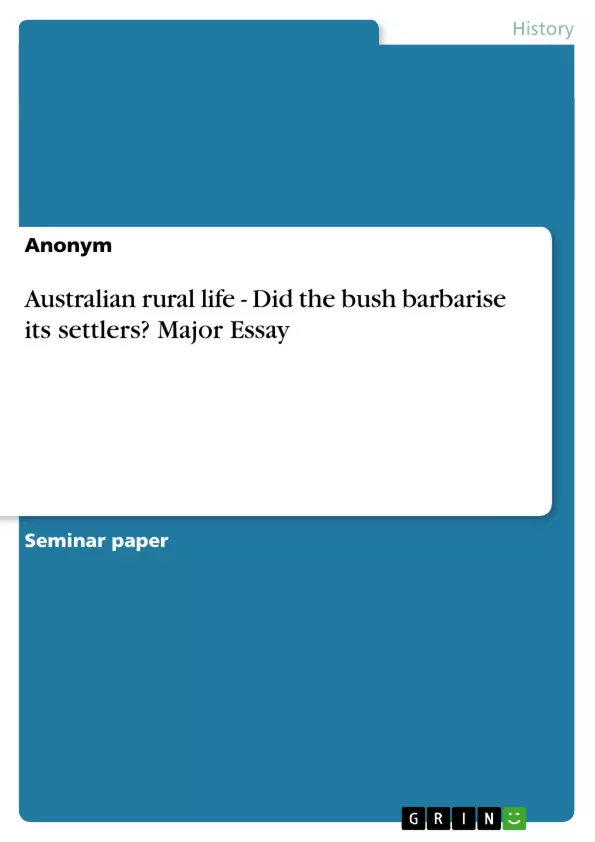In my essay I argue about the question if the bush in rural Australia in the 19th century is barbarising its settlers. While I am answering this question I am trying to give a representative insight into the life of selectors in Victoria.
Based on the statements of Manning Clark1 and J.W. McCarty2 I will show that even though there were a lot of different problems which made life hard for selectors, there was indeed a new kind of freedom and even a “progress towards happiness” for the early settlers. Looking at different primary sources (including collected data from selectors in the parishes of Kalkee) I finally want to disagree with Manning Clark’s statement that the continent itself is barbarising people. To understand the circumstances of living and to support my opinion I will also write about the problems that early settlers were confronted with as well as about the role of women and family.
Inhaltsverzeichnis (Table of Contents)
- Introduction
- Problems in selector's lives
- Role of the women
- Family as the key
- Freedom and happiness in the new land...
- Conclusion
Zielsetzung und Themenschwerpunkte (Objectives and Key Themes)
This essay examines the question of whether the Australian bush in the 19th century “barbarized” its settlers. It aims to provide a representative insight into the lives of selectors in Victoria, particularly focusing on the challenges they faced and the potential for achieving freedom and happiness in this new land. The essay draws on primary sources and the perspectives of prominent historians like Manning Clark and J.W. McCarty.
- The harsh realities of life for selectors in the Australian bush
- The impact of the land on the settlers' well-being and their relationship with society
- The role of women and family in rural life
- The importance of hard work, capital, and resilience in achieving success
- The contrasting perspectives on the bush's influence on its settlers, particularly regarding their ability to thrive and progress.
Zusammenfassung der Kapitel (Chapter Summaries)
- Introduction: Introduces the essay's central question and its focus on the experiences of selectors in Victoria. It outlines the use of primary sources and the perspectives of Manning Clark and J.W. McCarty to explore the relationship between the bush and its settlers.
- Problems in selector's lives: Discusses the challenges faced by selectors, including the conflict with established landholders, the demanding physical labor, and the difficulties of trading and managing livestock. It highlights the need for capital, resilience, and a strong work ethic to survive. This section also explores the issue of debt and its impact on the lives of settlers.
Schlüsselwörter (Keywords)
This essay focuses on the experiences of rural settlers in 19th century Australia, exploring the challenges they faced, their resilience, and the impact of the Australian bush on their lives. Key themes include the difficulties of establishing farms, the importance of family and community, the role of women in rural life, and the contrasting perspectives on the bush's influence on its settlers. The essay draws on primary sources, including diaries, letters, and official records.
Frequently Asked Questions
Did the Australian bush "barbarize" 19th-century settlers?
While some historians like Manning Clark argued the harsh environment led to barbarism, this essay argues that many settlers found a new kind of freedom and a "progress towards happiness" despite the hardships.
What were the main challenges for "selectors" in Victoria?
Selectors faced conflicts with established landholders, extreme physical labor, lack of capital, debt, and the difficulties of managing livestock in a remote and unforgiving landscape.
What was the role of women in rural Australian life?
Women were central to the survival of the farm, managing households, participating in farm labor, and providing the emotional and social foundation for the family unit in isolated areas.
How important was family for the success of early settlers?
Family was considered the "key" to success. The collective labor of parents and children was often the only way to make a selection (farm) viable without the means to hire outside help.
What primary sources are used to study this period?
The research utilizes diaries, letters, official records, and collected data from specific parishes, such as Kalkee, to provide an authentic look at the settlers' lives.
- Citation du texte
- Anonym (Auteur), 2005, Australian rural life - Did the bush barbarise its settlers? Major Essay, Munich, GRIN Verlag, https://www.grin.com/document/39602



